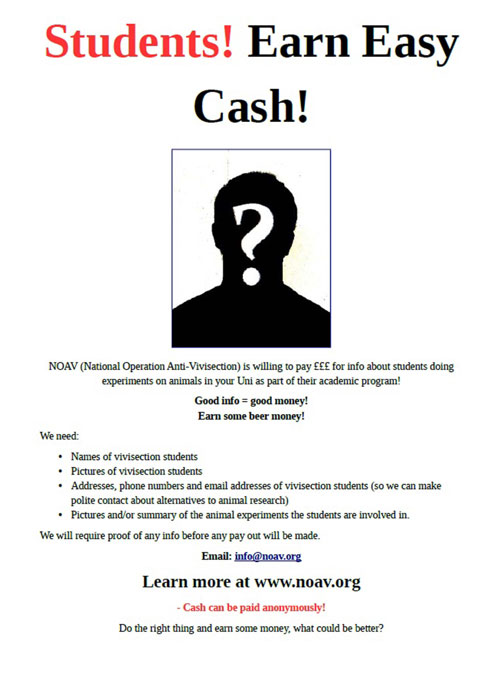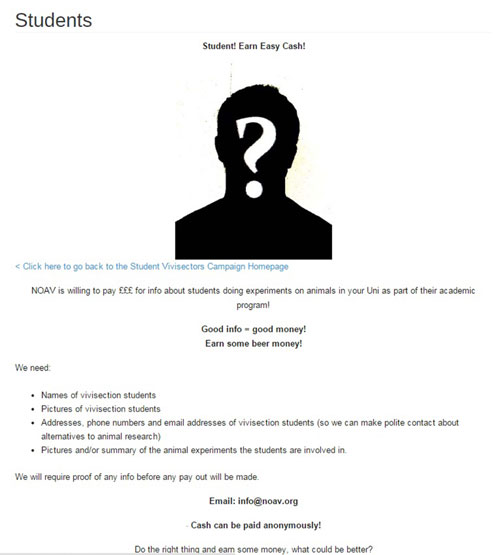SCOTS students have been paid up to £1,000 each to “inform” on fellow undergraduates who do experiments on animals, campaigners claimed yesterday.
National Operation Anti-Vivisection (NOAV) – a UK-based grassroots network – offers money for names, contact details and even pictures of students who use animals in their studies.
They say that they require the information to “make polite contact about alternatives to animal research”.
And they have now claimed that Edinburgh University has had one of the highest response rates, with undergraduates being paid “rewards ranging from £50 to £1000”.

The university conducted experiments which resulted in the deaths of 226,000 in 2012, saying the work was justified on “scientific, ethical and legal grounds” and when no alternatives were available.
The organisation threatens that those who continue to experiment on animals during their degree will “not get a moment’s peace from the ongoing aggressive but lawful pressure exerted by the animal rights movement.”
They believe that animal experimentation is “cruel, outdated and unscientific” and actively encourage students to get in touch with information.
Their website even provides poster print-outs for students to put up around campus.
William Evans, a NOAV spokesman, said: “There has been a great response from students, especially from Oxford, Cambridge, Imperial College [London] and Edinburgh, although other universities have also been represented.
Concerned
“As expected, the information is mainly from undergraduates about the work of postgraduates, PhD students and professors.
“Most students offering information did so because they were concerned about animal welfare and not for the monetary rewards. However, rewards ranging from £50 – £1,000 have been issued.

“Our organisation does not engage in any form of harassment and this is why our student contacts are happy to work with us.”
When contacted to ask about the amount of money paid for information, NOAV replied: “We understand that acquiring this info may take you a lot of time and effort. Therefore we can compensate you for your time.
“The amount will depend on the type of research being done and quality of information given.”
Their website states: “Those that abuse animals for a living don’t want others to know what they do, many are ashamed to even tell their children how they make their blood money.
“We do not believe they should be given the cover of anonymity. We believe social pressure from their peers is the best way to get them to reconsider their career choice.”
Action
They add that: “The time for thinking and plotting is over – it’s time for action. We are not a talking shop or a social club, we are a no nonsense anti-vivisection activist group.”
The group has also petitioned Cambridge, Oxford and Edinburgh University to allow them to take the place of animals in experiments.
Mr Evans added: “It is high time that universities move into the 21st century and start promoting human relevant research, such as computer modelling and micro-dosing.”
He explained that the campaign is intended to be “non-threatening, peaceful and legal”, saying: “We will not be disclosing any personal addresses or phone numbers that we receive, as our approach is based on social as opposed to physical pressure.”
Unlawful
NUS Scotland vice-president Robert Foster said last week: “Everyone has the right to hold firm political beliefs, and undertake protest to achieve them, but that must stop short of behaviour which is unlawful, or intimidating and distressing for those on the receiving end of it.
“Students have a right to receive their degrees without the fear and threat of violence hanging over them.”
A spokesman for Police Scotland said: “If anyone has any concerns about this we would advise them to contact us on 101. We also have personal and web safety advice on our website.
“We would investigate any complaint that was made to us.”

